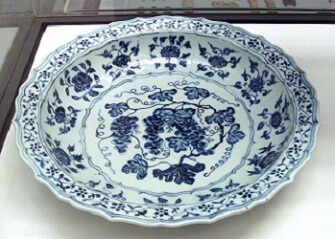Ming Collection Broken Up in Family Feud
Ming Collection Broken Up in Family Feud

The High Court has ruled that a unique collection of 17th century Ming dynasty porcelain must be divided between four siblings following a bitter dispute.
Sir Michael Butler, a former adviser to Margaret Thatcher and the principal architect of her victory in cutting the UK’s contribution to the European Community budget, began collecting the distinctive blue and white pottery more than 50 years ago. Experts have variously described the collection as "unique in the world" and "the finest and most extensive collection of its kind", the High Court heard.
From 1987, Sir Michael decided to share the best pieces in the collection among his children and over the ensuing years gave them 500 items, which were named the Butler Family Collection.
Trouble began immediately after father died
Relations between the siblings collapsed just four days after Sir Michael’s death in 2013, when James and Caroline discovered they had not been named as his executors, the court heard. Younger siblings Charles and Katharine Butler claimed their father would have wanted the Collection to remain intact at a private museum in Dorset where he lived, and said that it should be kept together to honour their father's achievements and preserve a "historic collection of irreplaceable value".
But their older siblings, Caroline and James, argued they were entitled to 125 pieces each and called on a judge to order them to be handed over.
John Brisby QC, for Charles, 49, and Katharine, 48, said Sir Michael must have imagined that his gift would "enrich his children's lives" and accused Caroline, 62, and James, 50, of being "hell-bent on breaking up the collection – in defiance of their parents' wishes.”
Caroline and James denied financial motives and said that they simply had a legal right to enjoy their inheritance from their father.
Judge Simon Barker found in favour of the two elder siblings who wanted to remove their share from the museum.
Father's wishes did not have 'legal significance'
In his ruling, judge Simon Barker noted that while Sir Michael’s wishes might “have some moral standing . . . they are of no legal significance.”
The case rested on a piece of property law, section 188 of the Law of Property Act 1925, which governs the division of “chattels”. It is rare for chattels to be owned, as in this case, in what is called undivided shares.
The case is set to go to appeal, with all parties committed to not selling any items from the collection until the final judgment. If the appeal is successful, Katharine Butler hopes to buy her siblings out and put the collection back on display in the family’s private museum in Mapperton, Dorset – which was purpose-built behind the family home in 2010.
"To be forced to sit there dismantling the collection against my will is a horrible thing to be dealing with," Katharine Butler said.
Last-ditch appeal to arts charity ended in failure
Ms. Butler had launched a petition urging her sister, Caroline, and Stephen Deuchar, director of the Art Fund charity, to help keep the collection together – but the Art Fund said it would not "interfere with a legal ruling".
An Art Fund spokeswoman said: "The Art Fund helps museums build their collections of art for the widest possible public to enjoy through our programme of grant giving . . . We respond on a case-by-case basis to applications but would not seek to interfere with a legal ruling or private family matter."
Legal experts in contentious probate
If you are considering contesting a will, please contact Amanda Melton, our expert in contentious probate on 01494 790047 or email amanda.melton@ibblaw.co.uk
